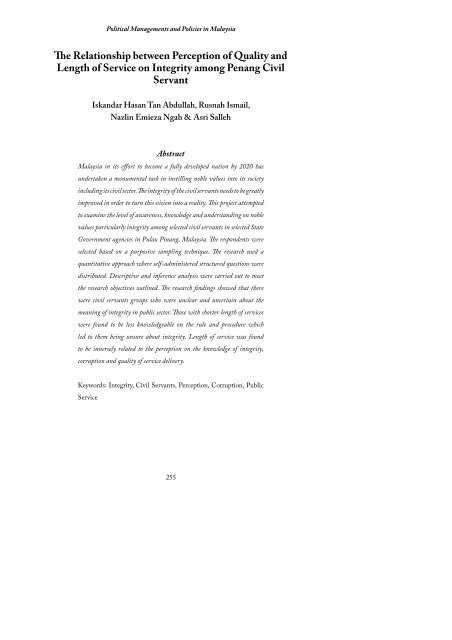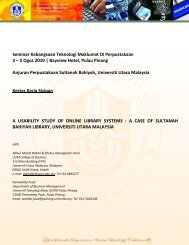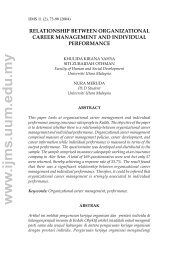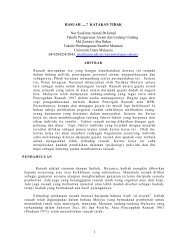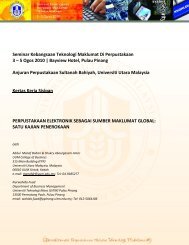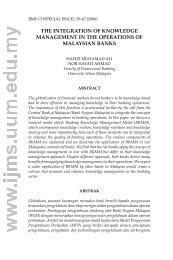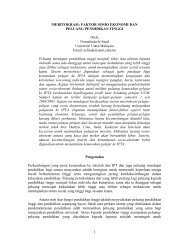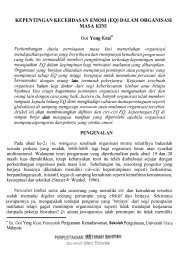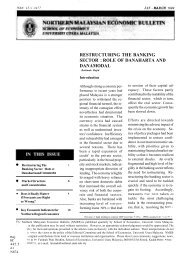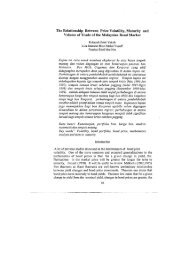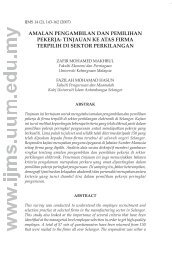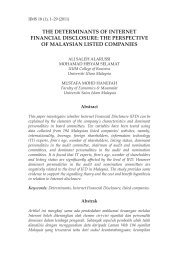e Relationship between Perception of Quality and Length of Service ...
e Relationship between Perception of Quality and Length of Service ...
e Relationship between Perception of Quality and Length of Service ...
You also want an ePaper? Increase the reach of your titles
YUMPU automatically turns print PDFs into web optimized ePapers that Google loves.
Political Managements <strong>and</strong> Policies in Malaysia<br />
e <strong>Relationship</strong> <strong>between</strong> <strong>Perception</strong> <strong>of</strong> <strong>Quality</strong> <strong>and</strong><br />
<strong>Length</strong> <strong>of</strong> <strong>Service</strong> on Integrity among Penang Civil<br />
Servant<br />
Isk<strong>and</strong>ar Hasan Tan Abdullah, Rusnah Ismail,<br />
Nazlin Emieza Ngah & Asri Salleh<br />
Abstract<br />
Malaysia in its eff ort to become a fully developed nation by 2020 has<br />
undertaken a monumental task in instilling noble values into its society<br />
including its civil sector. e integrity <strong>of</strong> the civil servants needs to be greatly<br />
improved in order to turn this vision into a reality. is project attempted<br />
to examine the level <strong>of</strong> awareness, knowledge <strong>and</strong> underst<strong>and</strong>ing on noble<br />
values particularly integrity among selected civil servants in selected State<br />
Government agencies in Pulau Pinang, Malaysia. e respondents were<br />
selected based on a purposive sampling technique. e research used a<br />
quantitative approach where self-administered structured questions were<br />
distributed. Descriptive <strong>and</strong> inference analysis were carried out to meet<br />
the research objectives outlined. e research fi ndings showed that there<br />
were civil servants groups who were unclear <strong>and</strong> uncertain about the<br />
meaning <strong>of</strong> integrity in public sector. ose with shorter length <strong>of</strong> services<br />
were found to be less knowledgeable on the rule <strong>and</strong> procedure which<br />
led to them being unsure about integrity. <strong>Length</strong> <strong>of</strong> service was found<br />
to be inversely related to the perception on the knowledge <strong>of</strong> integrity,<br />
corruption <strong>and</strong> quality <strong>of</strong> service delivery.<br />
Keywords: Integrity, Civil Servants, <strong>Perception</strong>, Corruption, Public<br />
<strong>Service</strong><br />
255
INTRODUCTION<br />
Seminar on National Resilience<br />
Malaysian in its eff ort to become a fully developed nation by 2020 has<br />
undertaken a monumental task in instilling noble values into its society<br />
including its civil sector. Consequently, among others, the Government<br />
has launched the “National Integrity Plan (NIP)” in 2004 <strong>of</strong> which main<br />
aim is to realize the fourth challenge <strong>of</strong> the Malaysia’s Vision 2020 i.e.<br />
to build a morally <strong>and</strong> ethically sound society where each individual<br />
encompasses strong religion <strong>and</strong> spiritual belief strongly rooted in good<br />
traits. NIP is a holistic plan aiming to tackle negative values in the society<br />
in an eff ort to instil the value <strong>of</strong> integrity among Malaysians (NIP<br />
H<strong>and</strong>book, 2004). In order to achieve this, the Government believes that<br />
it is only appropriate that civil servants be part <strong>of</strong> the instilling process by<br />
emphasizing on them the value <strong>of</strong> integrity.<br />
e commitment <strong>of</strong> Malaysian civil servants is vital to ensure that the<br />
Government policies are well implemented. Hence, the establishment <strong>of</strong><br />
Malaysia Institute <strong>of</strong> Integrity provides a major boost to help develop the<br />
necessary human capital <strong>and</strong> knowledge resources <strong>of</strong> the public sector<br />
(Abdullah, 2004). e NIP had set its 2008 target to reduce corruption,<br />
malpractices <strong>and</strong> abuse <strong>of</strong> power <strong>and</strong> to increase effi ciency <strong>of</strong> the public<br />
delivery system <strong>and</strong> overcome bureaucratic red–tape. However, the main<br />
obstacle to the achievement <strong>of</strong> the NIP’s Target 2008 appeared to be<br />
the perception that the public sector <strong>and</strong> the elected <strong>and</strong> appointed<br />
representatives were corrupt <strong>and</strong> ineffi cient.<br />
e last two decades have seen major changes <strong>and</strong> innovations being<br />
introduced into the civil sector in order to provide better services to the<br />
public. According to Tan Sri Sidek Hassan (2006), the Government has<br />
introduced many reforms in public administration to enhance effi ciency<br />
<strong>and</strong> eff ectiveness <strong>of</strong> the civil service beginning with the excellent work<br />
culture initiative in 1989 (Gerakan Budaya Kerja Cemerlang), put into<br />
eff ect through the implementation <strong>of</strong> public service administrative<br />
circulars (Pekeliling Kemajuan Pentadbiran Awam [PKPA]). Although a<br />
256
Political Managements <strong>and</strong> Policies in Malaysia<br />
lot <strong>of</strong> successes have been achieved since then, a lot more remain to be<br />
done. e commitment <strong>of</strong> civil servants still plays a vital role in ensuring<br />
that the smooth execution <strong>of</strong> the Government policies.<br />
Integrity refers to a quality <strong>of</strong> excellence manifested in a holistic <strong>and</strong><br />
integral manner in individuals <strong>and</strong> organizations (NIP H<strong>and</strong>book 2004).<br />
In its specifi c sense, integrity in civil service means an observance <strong>of</strong><br />
competency values, commitment to address <strong>and</strong> eliminate corruption, to<br />
increase the effi ciency <strong>and</strong> eff ectiveness <strong>of</strong> organizations either public<br />
or private as well as family units <strong>and</strong> lastly, to enhance the social welfare<br />
<strong>and</strong> the quality <strong>of</strong> life. It also includes the accountability, transparency<br />
<strong>and</strong> responsibility.<br />
Gaining trust in the civil service is inevitably an integral part <strong>of</strong> the<br />
NIP. However, although many consider trust as a desirable value in<br />
administration, they also fi nd it elusive. It is entirely possible that the<br />
meaning <strong>of</strong> trust may get even more elusive when one seeks to optimize<br />
it in administration (Choudhury 2008). e elusiveness may stem<br />
from the huge diff erences <strong>of</strong> the values that the people associate the<br />
public sector with such as legitimacy, lawfulness, accountability, <strong>and</strong><br />
impartiality. ese are contrastingly diff erent with the values the people<br />
associate the private sector with such as pr<strong>of</strong>i tability, competitiveness <strong>and</strong><br />
customer orientation (Graaf <strong>and</strong> Wal 2008). Notwithst<strong>and</strong>ing the varied<br />
underst<strong>and</strong>ings <strong>of</strong> integrity, it is all about observance <strong>of</strong> competency<br />
values, commitment to address <strong>and</strong> eliminate corruption, to increase the<br />
effi ciency <strong>and</strong> eff ectiveness <strong>of</strong> organization <strong>of</strong> either public or private<br />
as well as family units. Undeniably, integrity is important to eliminate<br />
corruption <strong>and</strong> abuse <strong>of</strong> power (Noreha Hashim, 2008).<br />
Besides, according to Susan Babbitt (1997), an adequate account <strong>of</strong><br />
personal integrity must recognize that some social structures are <strong>of</strong> the<br />
wrong sort altogether for some individuals to be able to pursue personal<br />
integrity <strong>and</strong> that questions about the moral nature <strong>of</strong> society <strong>of</strong>ten<br />
257
Seminar on National Resilience<br />
need to be asked fi rst before questions about personal integrity can be<br />
properly be raised. For W. Paati Ofosu-Amaah (1999), the Asia <strong>and</strong><br />
Pacifi c regions are characterized by countries with a range <strong>of</strong> institutional<br />
development in safeguarding integrity <strong>and</strong> accountability in their<br />
administrations. Singapore, for one, provides a good example <strong>of</strong> an Asian<br />
country with the near absence <strong>of</strong> corruption problem. is, according to<br />
Syed Hussein Alatas (1999), means that the authority is not dominated<br />
<strong>and</strong> manipulated by corrupt elements. It eff ectively reveals one common<br />
theme that primary emphasis on prevention <strong>of</strong> future corruption <strong>and</strong> on<br />
changing systems through values should be based on eff orts to create a<br />
culture <strong>of</strong> pr<strong>of</strong>essionalism. erefore, the importance <strong>of</strong> a civil perception<br />
on integrity itself must be clear <strong>and</strong> the rules must be followed.<br />
is research is signifi cant in the sense that it can be seen as one <strong>of</strong><br />
the attempts to provide a preliminary indication with which to measure<br />
the success <strong>of</strong> the Government’s eff ort to instil noble values among the<br />
civil servants. e main objective <strong>of</strong> this research is to evaluate integrity<br />
perception against public sectors in term <strong>of</strong> their eff ectiveness, effi ciency,<br />
honestly, accountability in service provided.<br />
METHODOLOGY<br />
e main source used for research analysis was a set <strong>of</strong> data collected<br />
through the questionnaire. e study was among the fi rst being conducted<br />
after the launch <strong>of</strong> the NIP on 23 April, 2004. ere were about 10,000<br />
civil servants working in public sector in Penang. e sample <strong>of</strong> the study<br />
consisted <strong>of</strong> 74 civil servants. e sample comprised 14 from Department<br />
<strong>of</strong> Education Penang, 30 from Penang State Secretary Offi ce <strong>and</strong> 40<br />
from Department <strong>of</strong> Health. Convenience sampling was used to<br />
collect data from two (2) levels <strong>of</strong> categories such as Pr<strong>of</strong>essional <strong>and</strong><br />
Management Staff , Support Staff 1 <strong>and</strong> Support Staff 2. e selection <strong>of</strong><br />
the respondents is based on Purposive Sampling technique.<br />
258
Data Analysis<br />
Political Managements <strong>and</strong> Policies in Malaysia<br />
Questionnaires were used <strong>and</strong> analyzed descriptively using “Statistical<br />
Package for Social Sciences” (SPSS). Descriptive <strong>and</strong> inference analysis<br />
were carried out to meet the research objectives outlined. To test the<br />
hypothesis, CrossTab <strong>and</strong> T-Test are used to measure the correlation<br />
<strong>between</strong> dependant variables (demographic variables) <strong>and</strong> independent<br />
variables (perception).<br />
RESULT AND DISCUSSION<br />
Findings from the perception <strong>of</strong> civil servants on the knowledge <strong>of</strong> integrity<br />
showed that a lot <strong>of</strong> respondents agreed that they did underst<strong>and</strong> that (a)<br />
receiving a gift (money, items, or services) as a token <strong>of</strong> appreciation is<br />
considered as bribery, (55.4% agreed while 20.3% very agreed),(b) using<br />
<strong>of</strong>fi ce money for own benefi ts is part <strong>of</strong> corruption (54.1% agreed, 24.6%<br />
very agreed) ,(c) gaining extra money by forcing the clients – (83.8 %<br />
agreed, 12.2% very agreed) , (d) directly involved in giving out contract<br />
to own relatives, (52.7 % agreed <strong>and</strong> another 13.5 % very agreed), (e)<br />
directly involved in hiring own relatives into the departments - (40.5 %<br />
agreed, 31.1% very agreed), (f ) provide false logging <strong>and</strong> accommodation<br />
claims (37.8 % agreed, 16.2 % very agreed), (g) abused <strong>of</strong>fi ce’s assets/<br />
belongings (54.1 % agreed, 20.3% very agreed), (h) intimidating actions<br />
in order to get money from clients (52.7 % agreed, 21.6% very agreed)<br />
<strong>and</strong> (i) abused power or position in order to gain something (50% agreed,<br />
24.3 % very agreed).<br />
In this research, the respondents consisted <strong>of</strong> 59.5% <strong>of</strong> Support group<br />
while 40.5% came from Pr<strong>of</strong>essional <strong>and</strong> Administration group. 52.7%<br />
were from Secondary level while 41.9% were from tertiary level. It could<br />
be stated that most <strong>of</strong> the respondents did not fully underst<strong>and</strong> their job<br />
scope <strong>and</strong> responsibility. e levels <strong>of</strong> education <strong>of</strong> respondents gave us a<br />
pro<strong>of</strong> that respondents who were in the mid-section <strong>of</strong> education levels<br />
needed to have their behaviour monitored. For example, in providing false<br />
logging <strong>and</strong> accommodation, it showed that they did not underst<strong>and</strong> the<br />
259
Seminar on National Resilience<br />
fi nancial circular about making claims that is what was entitled <strong>and</strong> what<br />
was not.<br />
Some areas <strong>of</strong> underst<strong>and</strong>ing such as involving oneself in hiring relatives<br />
into the departments needs to be clarifi ed as unethical. Civil servants<br />
need to underst<strong>and</strong> that it is not about the opportunity <strong>of</strong> helping their<br />
own relatives but rather as blocking others’ opportunities. In the section<br />
with regard to the quality <strong>of</strong> service <strong>of</strong> the Government department<br />
<strong>and</strong> the staff ’s perceptions <strong>and</strong> knowledge <strong>of</strong> good quality service, the<br />
fi ndings showed some unsure decisions. is part <strong>of</strong> study showed some<br />
aspect likes (a) in what extent the Government servants are keen to learn<br />
<strong>and</strong> know about the quality <strong>and</strong> practicing it in their daily works, (b) in<br />
what extent the Government servants are sure to treat the clients with<br />
the quality services in their works <strong>and</strong> (c) the perceptions among the<br />
Government servants in the quality <strong>of</strong> their departments in delivering<br />
the services to the public.<br />
Similarly, the Government servants were also given the same plot from<br />
the questionnaire done on the quality <strong>of</strong> the current public service. e<br />
feedback from the Government servants showed that the unsure were<br />
24.3 % compared to the disagreeable <strong>of</strong> 29.7%. From this perspective,<br />
some factors might have contributed to this issue <strong>of</strong> low quality <strong>of</strong> public<br />
service. Among others, Government servants tend to not to utilize<br />
effi ciently their working hours while at the same time, also tend to make<br />
their clients wait for long hours.<br />
It can be concluded herewith that most <strong>of</strong> the Government servants were<br />
not keen to give defi nitive or affi rmative answers because <strong>of</strong> some private<br />
issues regarding their perceptions on their departments. It might also<br />
mean that it was hard to obtain the actual views from the Government<br />
servants in this section. Additionally, it also suggested that most <strong>of</strong> the<br />
Government servants were still in dilemma because <strong>of</strong> unsure decisions<br />
on their perceptions regarding the means <strong>and</strong> knowledge related to the<br />
260
Political Managements <strong>and</strong> Policies in Malaysia<br />
quality. Probably, it could be attributed to the lack <strong>of</strong> reading <strong>and</strong> slow in<br />
learning <strong>of</strong> a new thing regarding integrity introduced by their respective<br />
departments.<br />
Section A: <strong>Perception</strong> <strong>of</strong> Civil Servants on Public <strong>Service</strong> <strong>Quality</strong><br />
is section deals with the perception on the quality <strong>of</strong> service in<br />
Government departments <strong>and</strong> their perceptions on the knowledge <strong>of</strong> good<br />
quality service. e survey shows some indecision on their departments.<br />
is study also shows some aspects such as:<br />
i.<br />
ii.<br />
iii.<br />
To what extent do Government servants keen to learn<br />
<strong>and</strong> know about the quality <strong>of</strong> service <strong>and</strong> practising it in<br />
their daily works?<br />
To what extent do Government servants know on how<br />
to treat their clients with quality services?<br />
e perceptions among the Government servants in the<br />
quality <strong>of</strong> the service provided by their departments to<br />
the public.<br />
All <strong>of</strong> these items have brought down the quality <strong>of</strong> public service <strong>and</strong><br />
in my point <strong>of</strong> view, it could be due to the fact that civil servants do not<br />
rely on their customers’ charter. As a conclusion for this part, it is safe to<br />
say that most civil servants are not keen to provide answers especially on<br />
personal <strong>and</strong> private issues regarding their departments.<br />
Section B: <strong>Perception</strong> <strong>of</strong> Civil Servants on organizational integrity<br />
Overall, from the survey done on the perceptions <strong>of</strong> the civil servants<br />
on their departments’ integrity, the result shows that most <strong>of</strong> them were<br />
satisfi ed with their organization especially in having clear sets <strong>of</strong> rules<br />
<strong>and</strong> regulations to instil integrity. It can be seen in a few criteria like:<br />
i.<br />
ii.<br />
<strong>Perception</strong>s <strong>of</strong> the staff regarding their departments<br />
<strong>Perception</strong>s <strong>of</strong> the staff regarding the general order, rules<br />
<strong>and</strong> regulations in their departments<br />
261
iii.<br />
iv.<br />
v.<br />
Seminar on National Resilience<br />
<strong>Perception</strong>s <strong>of</strong> the staff regarding the role <strong>of</strong> Government<br />
in interpreting integrity like auditing, punishment <strong>and</strong><br />
<strong>of</strong>f ences <strong>of</strong> rule <strong>and</strong> accountability.<br />
Rewarding <strong>and</strong> motivating staff to increase their<br />
integrity<br />
External infl uence on their department <strong>of</strong> integrity<br />
e result shows that Government servants underst<strong>and</strong>ing <strong>of</strong> General<br />
Order were 51.4%, Government servants understood what was to<br />
be defi ned as gifts 52.7%, Government servant who agreed that the<br />
current the work conditions was comfortable for them were 66.2%,<br />
the harmonious relation <strong>between</strong> the superior <strong>and</strong> subordinates were<br />
78.4%, the examples <strong>of</strong> good manner by their superior were 78.2%. ese<br />
mean that the staff s believed that their departments were doing well in<br />
upholding the good noble values.<br />
e percentage <strong>of</strong> civil servants who felt that their superiors treated them<br />
with unfairness was 64.4%. However, the civil servants who believed that<br />
political people did get involved in their daily works shot up to 87.8%.<br />
is shows that political infl uence did aff ect civil servants’ integrity<br />
level.<br />
e fi ndings <strong>of</strong> this study indicate that there are signifi cant diff erences<br />
on job categories <strong>and</strong> perception on the knowledge <strong>of</strong> integrity. Table 2.4<br />
shows One Way ANOVA analyses (F = 1.245, p > 0.005) <strong>and</strong> shows that<br />
there is an insignifi cant diff erence in terms <strong>of</strong> job categories compared<br />
with length <strong>of</strong> services which is showed One way ANOVA ( F =<br />
5.529, p < 0.005) signifi cant relationship with knowledge <strong>of</strong> integrity.<br />
e analyses shows that there is no diff erent perception on knowledge<br />
<strong>of</strong> integrity <strong>between</strong> civil management level <strong>and</strong> support group among<br />
the civil servants but the length <strong>of</strong> services had infl uenced civil servants<br />
toward their knowledge <strong>and</strong> underst<strong>and</strong>ing. e new staff could be less<br />
knowledgeable <strong>and</strong> underst<strong>and</strong>ing about the rule <strong>and</strong> procedures in<br />
determining which was right <strong>and</strong> which was wrong.<br />
262
Political Managements <strong>and</strong> Policies in Malaysia<br />
CONCLUSIONS AND RECOMENDATIONS<br />
e analysis on the perception <strong>of</strong> the civil servants on integrity revealed<br />
that there were groups <strong>of</strong> civil service who were unclear <strong>and</strong> uncertain<br />
about the meaning <strong>of</strong> integrity in public sector. ose with shorter length<br />
<strong>of</strong> services were less knowledgeable on the rule <strong>and</strong> procedure which<br />
led to them being unsure about integrity. However, there are problems<br />
<strong>and</strong> limitations in this research where respondents may or may have not<br />
disclosed the actual truth when answering questions such as their own<br />
perceptions on their own departments <strong>and</strong> in particular about themselves.<br />
For that reason, future research may improve on such limitation.<br />
Bibliography<br />
Abdullah, A. B., 2004. Corporate sector against corruption. Journal <strong>of</strong><br />
Malaysian Management Review, 2 (2).<br />
Alatas S. H., 1999. Corruption <strong>and</strong> the Destiny <strong>of</strong> Asia, Prentice Hall (M)<br />
Sdn Bhd, Simon & Schuster (Asia) Pte. Ltd.<br />
Arvis J. F. & Berenbeim R., 2002. Implementing anti-corruption<br />
programs in the private sector. Lessons from East Asia. World<br />
Bank. Malaysian Management Review Journal. 2.<br />
Atory, H., 2003. Reformasi Pentadbiran Awam Malaysia (Reforms in<br />
Malaysian Civil <strong>Service</strong>). Sintok: Universiti Utara Malaysia.<br />
Babbit, S. E., 1997. Personal Integrity, Politics <strong>and</strong> Moral Imagination,’<br />
Brennan, S; Isaacs, T. <strong>and</strong> Milde, M (eds.) A Question <strong>of</strong> Values:<br />
New Canadian Perspectives on Ethics <strong>and</strong> Political Philosophy.<br />
Masterdam <strong>and</strong> Atlanta: Rodopi.<br />
Choudhury, E., 2008. Trust in Administration: An Integrative Approach<br />
to Optimal Trust. Journal <strong>of</strong> Administration & Society, 40 (6),<br />
586-620.<br />
Cumaraswamy, P., 2005. e Importance <strong>of</strong> a Free Press. e Kuala<br />
Lumpur Society for Transparency <strong>and</strong> Integrity Journal, 6 (1), 3.<br />
263
Seminar on National Resilience<br />
Government <strong>of</strong> Malaysia (2004). National Integrity Plan, Institut<br />
Integriti Malaysia, Kuala Lumpur<br />
Graaf, G. <strong>and</strong> Wal, Z., 2008. On Value Diff erences Experienced by Sector<br />
Switchers. Journal <strong>of</strong> Administration & Society, 40 (1), 79-103.<br />
Kaufman H., 2001. Major players: bureaucracies in American government.<br />
Public Administration Review, 61(1), 18-32.<br />
Malaysian Anti-Corrupion Agency. 2005. Laporan Buletin Tahunan<br />
BPR (BPR Annual Report Bulletin). Kuala Lumpur: Percetakan<br />
Nasional<br />
Malaysia Institute <strong>of</strong> Integrity. 2005. Booklet; From Roots to Fruits. Kuala<br />
Lumpur: Malaysia Institute <strong>of</strong> Integrity.<br />
Madison J., 1788. e structure <strong>of</strong> the government must furnish the<br />
proper checks <strong>and</strong> balances <strong>between</strong> the diff erent departments.<br />
Federalist No 51, Independent Journal.<br />
Mokhtafi zam A., 2004. Perb<strong>and</strong>ingan pentadbiran sektor awam dan swasta.<br />
Sintok: Universiti Utara Malaysia.<br />
Navaratnam R. V. 2003. Malaysia’s Economic Challenges. A Critical<br />
Analysis <strong>of</strong> the Malaysian Economy, Governance <strong>and</strong> Society. Kuala<br />
Lumpur: ASEAN Academic Press.<br />
Noreha, H., 2008. e Integrity <strong>of</strong> the Public Sector: Issues from within <strong>and</strong><br />
without. Universiti Sains Malaysia: Georgetown.<br />
Transparency International. 2006. Transparency International Bribe<br />
Payers Index (BPI) 2006 Analysis Report. Retrieved 21 July<br />
2007 from http://www.transparency.org.my/BPIAnnualReport<br />
2006.htm<br />
W.Paati Ofosu-Amaah, 1999. Combating Corruption, A Comparative<br />
Review <strong>of</strong> selected Legal Aspects <strong>of</strong> State Practice <strong>and</strong> Major<br />
International Initiatives. e World Bank.<br />
264


